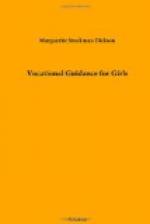Passing from the elemental needs, shelter, warmth, food, and clothing, we enter upon the most complex of woman’s duties—adjustment of her home to community conditions and provision for her family’s share in community life. That these more abstract problems frequently overlap the concrete ones already enumerated need not be said. It is impossible, even if we so desire, to live “to ourselves alone.” We shall undoubtedly stand for something in the community, whether consciously or otherwise. If it were given us to know the extent of our influence, we should probably be appalled at the crossing and recrossing of the lines emanating from our daily lives.
In some households there are definite aims in the direction of community life. These differ widely. In many the question seems to be entirely, “What can I get from the community?” in some, “What can I give?” in a few, “What can I share?” Of the three, the last is without doubt the one which contributes most to community well-being.
[Illustration: Photograph by Brown Bros. A community Christmas tree. Even the younger children may be given the opportunity to take part in community work]
The ordinary family of necessity touches community life at one time or another at certain well-defined points. The efficient homemaker must therefore make intelligent provision for these points of contact with the community.
Church and charity organizations have always been recognized in American life as community matters and have provided community meeting places and community work. Through them, especially in earlier days, women often found their only common activities. The school furnished the same common ground for the children. In the present time of multiplied activity these organizations still stand in the foreground. In them, both young and old find perhaps their best opportunity for “team work.”
A parish in which all pull together is perhaps as rare as a school in which every child truly desires to learn. Yet neither is beyond the possibilities. To keep each family in a proper attitude toward these community institutions is part of the homemaker’s work—and a delicate task it often is. It is not enough for a mother to adopt a cast-iron policy of indiscriminate approval of pastor or teacher, although that is often recommended. Do you remember your resentment as a child of the inflexible judgment “The teacher must be right”? Really there is no “must” about it, and the child knows that as well as we. The mother, therefore, who is able to review the matter in dispute calmly, justly, and withal sympathetically, and who indorses the teacher’s action after such review, is a better conserver of the public peace than the prejudging mother.




